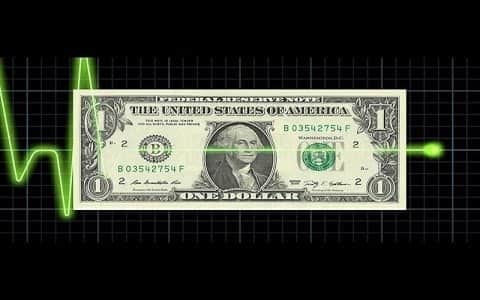Failing to fix the spending problem spells disaster for the United States... and for the US dollar.
I wrote recently how the Congressional Budget Office projects the US government will add $20 trillion to the national debt through 2033.
$20 trillion is an absurd amount of new debt. And there are very few groups and institutions capable of loaning such a vast sum of money.
Social Security, for example, was one of the biggest buyers of US government bonds for several decades. And at this point they own roughly $3 trillion of the national debt.
But Social Security is now bleeding so much money that the program is no longer able to loan the Treasury Department any more money.
Foreigners also used to be highly reliable buyers of US Treasury bonds; even as recently as a few years ago, foreign ownership of US federal debt was more than 33%.
But foreigners are rapidly losing their appetite for US government bonds, and their ownership has plummeted to 22% very quickly.
Now, in many ways it's good that the US no longer owes so much of its debt to foreigners.
Except that this only leaves one reliable institution remaining to buy up all that new debt: the Federal Reserve.
Remember, the Fed's unelected Federal Open Market Committee (FOMC) holds periodic closed-door meetings to make decisions about the US money supply.
When they expand the money supply, they give it a very technical sounding name (like "Quantitative Easing"). But ultimately what this means is that they conjure trillions of dollars out of thin air with the click of a button.
It's actually quite bizarre when you think about it; they make a few entries into an electronic ledger, and, poof, new money exists.
(It's essentially the electronic version of having a printing press, which is why we often just say that the Fed 'prints money'.)
The Fed then lends that money to the federal government, and the mechanism for this is buying US Treasury bonds.
Because the Fed has this special ability to print money- something which no one else is legally allowed to do- there is realistically no limit to how many bonds they can buy. If the government needs to borrow $20 trillion, the Fed has the capacity to print and lend $20 trillion.
And this is the key issue: when individuals, corporations, or even foreign governments buy US Treasury Bonds, they are buying those bonds with existing money that's already in the system.
But when the Fed buys US Treasury Bonds, they do it by conjuring new money out of thin air.
And this new money creates more inflation.
This isn't some wild theory; we all experienced the effects firsthand during the pandemic; the US government spent so much money in 2020 and 2021 that the national debt increased by more than $6 trillion.
The Fed created about $4 trillion of new money to buy the biggest chunk of that debt. And the end result of so much sudden, new money was 9% inflation.
So, if $4 trillion in new money caused 9% inflation, how much inflation will $20 trillion create? No one can predict the effect precisely, but it probably won't be zero.
Remember, this $20 trillion figure for new debt is the government's own forecast over the next ten years (and it might be on the low side).
But most of this amount, i.e. $15+ trillion, will accumulate over the next 5-7 years. So this is really the time frame for increased inflation risk... and serious threats to the US dollar.
Because with an explosion in US government debt- and renewed inflation- there is a very strong chance that foreigners will finally demand a change.
The United States and the US dollar have been in command of the global financial system ever since the Bretton Woods Agreement was signed at the end of World War II.
This agreement made the US dollar the world's dominant reserve currency, forcing every nation, every major bank, every large corporation to hold US dollars for international trade and financial transactions.
The dollar's reserve status is a very special privilege for the United States. But if the world finally demand a new, de-dollarized system, then foreigners would no longer need to hold US dollar assets- including US government bonds.
Even though foreign ownership of US debt is already dwindling, losing reserve status would cause that percentage to drop very quickly. And the Fed would need to print even more money to make up for the loss of foreign investors... causing even more inflation.
Now, I've written before that, at least for the moment, there are still a handful of ways that the US could navigate out of this mess. But options are narrowing and the window to act is closing.
And if no action is taken, the scenario I outlined above is likely to play out over the next 5-7 years if not sooner.
 By Simon Black/Activist Post February 01, 2024
By Simon Black/Activist Post February 01, 2024
 By Simon Black/Activist Post February 01, 2024
By Simon Black/Activist Post February 01, 2024